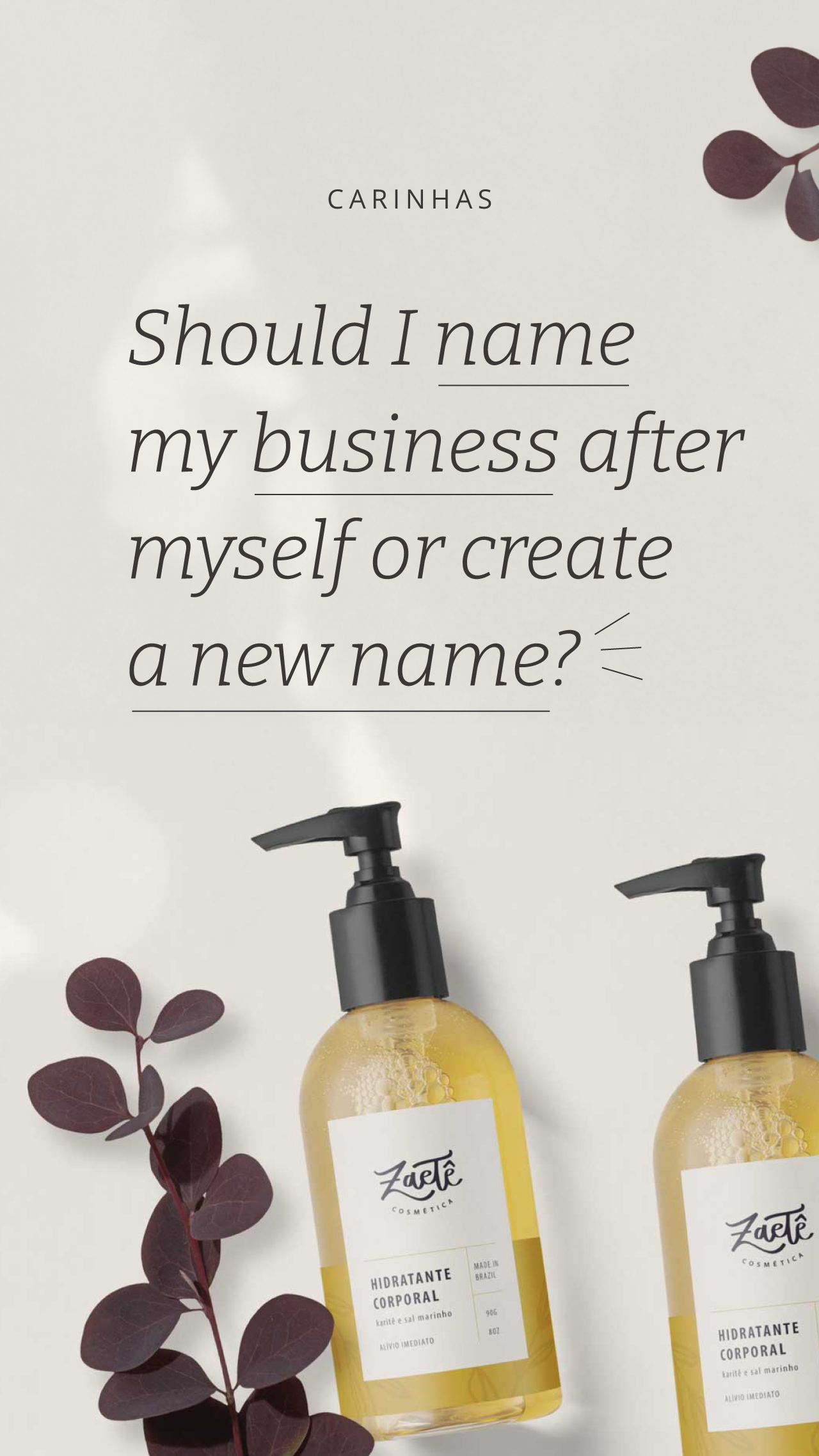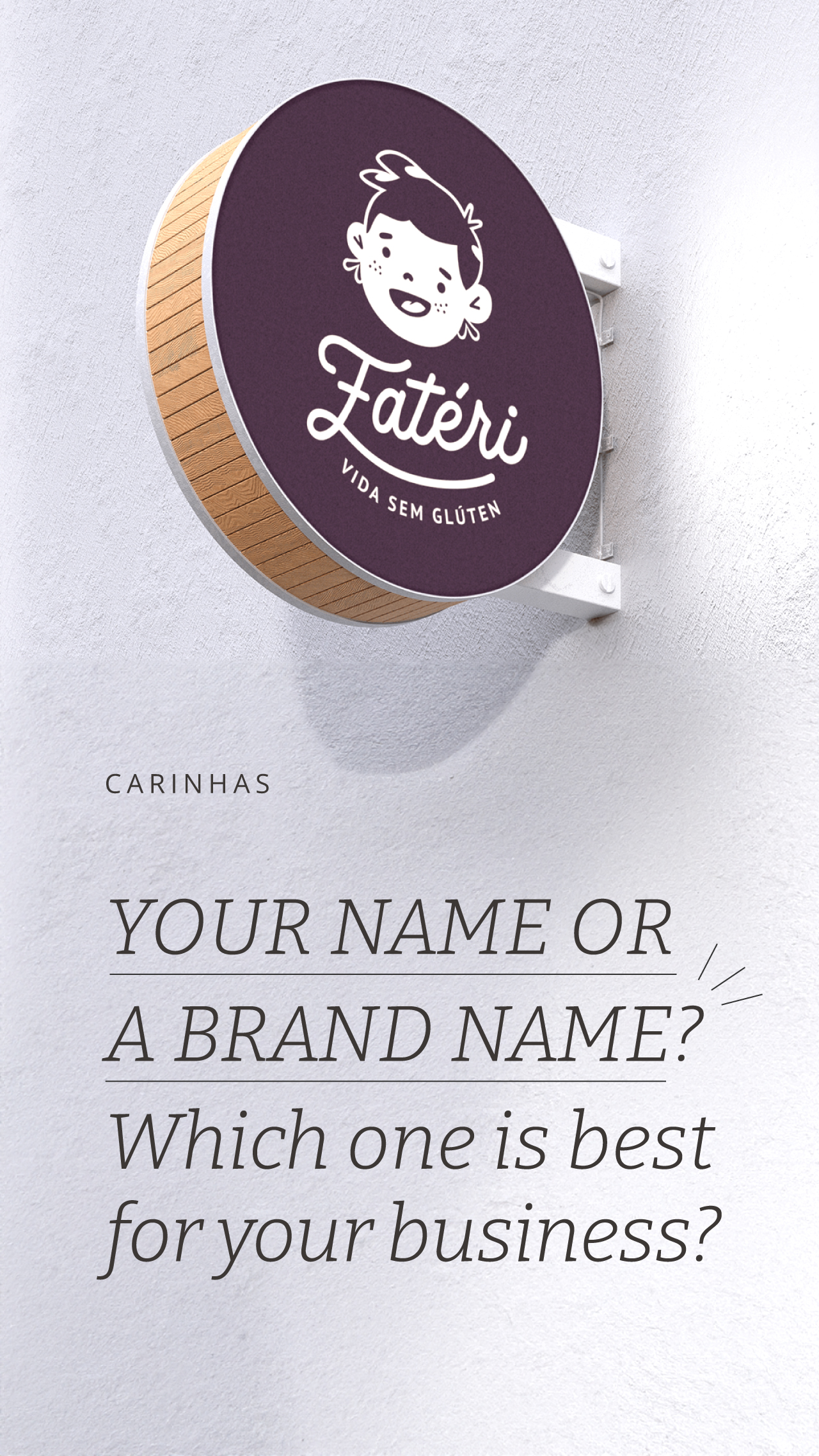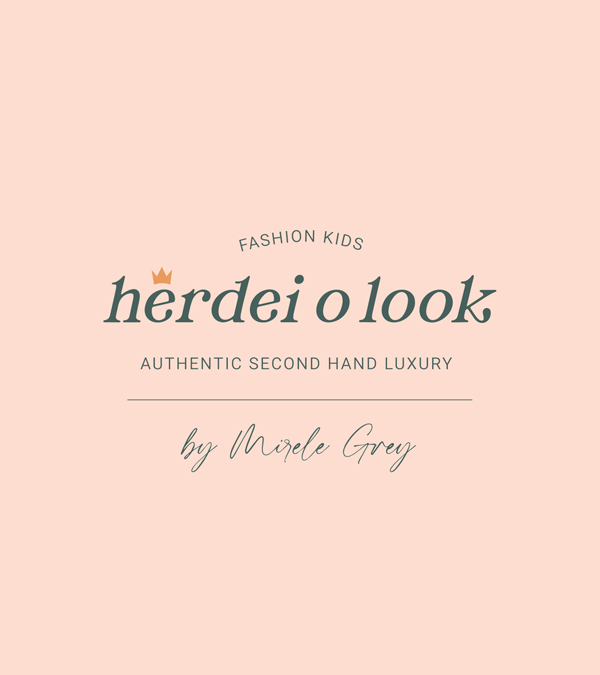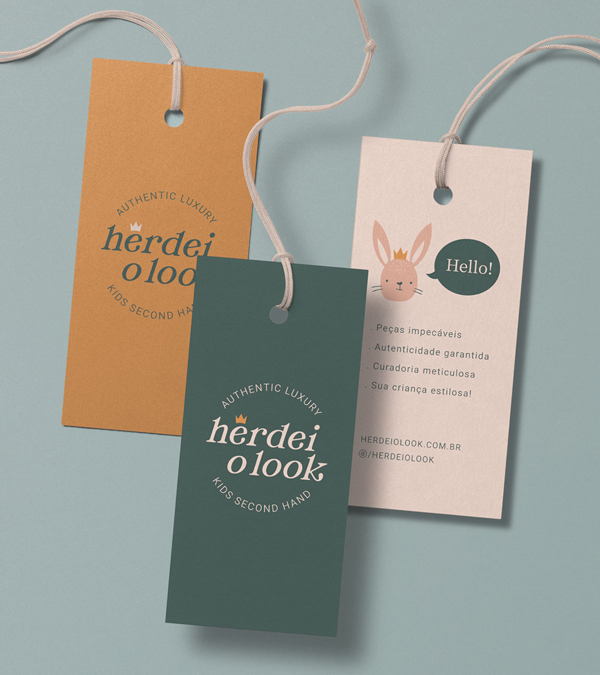“Should I use my own name, which my friends and family already know, or is it better to create a new name for the company?” This question often arises when someone is taking the first steps with their own business. And it makes perfect sense. Using your own name is the most direct path, already known by those close to you, and seems easier to start with. On the other hand, creating a new name can open up broader possibilities but also requires more effort. So, what’s better for your case?
“You know the name you were given, not the name you have.”
José Saramago
The truth is, there’s no one-size-fits-all answer. The company’s name says a lot about it even before any image, so it needs to align with the brand strategy, your plans, and the type of relationship you want to build with the public. Oh, and an important detail: some sectors, like law, legally require that the name or surname of at least one partner be in the company’s name. Even so, it’s possible to complement it with a word that helps better communicate your services. In areas like photography and architecture, it’s very common to use one’s own name, but in this case, there’s no legal obligation.
Let’s go through some points that can help in your choice. Each path has its advantages and disadvantages. Our goal here is to support you in making a decision that makes sense for your business, with clarity and calm.
1 – Professional Posture and Stature
Using your own name places you, or the founding group, at the center of the company. It’s a choice that communicates closeness, trust, and authorship. The focus is on who provides the service, so this type of name carries personal authority and is often used in areas like architecture, photography, and health, for example. It works especially well when it makes sense for the relationship with the public to happen directly with the person who created the business. On the other hand, the personal name can end up being associated with a smaller business or freelance work, especially if the company is just starting. This isn’t a problem in itself, but it’s worth considering if this type of perception aligns with your future plans.
Creating a unique name for your company helps communicate stature and vision. Even if you’re currently handling everything on your own or with a small team, a strategically created name can convey the idea of a larger structure, of a project that’s going to grow. And sometimes that’s exactly what we need: a name that says “it’s small, but it’s serious”, “we’re few, but we’re building something bigger”. If you’re facing this doubt now, take a deep breath. This type of choice doesn’t need to be made hastily; with care and strategy, the right name will appear.
That’s what happened with the company that was previously called W Burger, named after the partner Wellington’s initial. Over time, he felt the need for a more professional name, something that reflected the smoky flavor of the charcoal-grilled burgers and the bold step of launching a food truck. Thus, we created the name Bendita Chama (means “Blessed Flame” in Portuguese), a brand with more presence, personality, and room to grow. The change made the company stop seeming like a one-person business and gain strength as a brand.
From a personal name to a brand full of flavor and presence: Bendita Chama was born to bring flame-grilled burgers — and a lot of personality — wherever it goes. See the full project.
2 – Meaning of the Name
The name you carry was a gift, chosen with affection by someone at the beginning of your story. But whoever named you couldn’t predict that one day your company would also exist, with its own dreams, focus, and personality. Therefore, when we use our own name as the company’s name, we bring along this more personal and intimate meaning, which can be beautiful but can also pose a certain communication challenge.
In this case, it’s common to rely on other elements to contextualize what the company does and what it represents. Taglines, narratives, and visual choices become fundamental to convey the business’s value and proposal. And, of course, over time and with good market performance, this name gains substance, carrying the built reputation. On the other hand, by creating a name from scratch, you have the chance to shape it carefully from the start, already thinking about the essence, differentiators, and feelings you want to convey. This can greatly help highlight your company and facilitate connection with the public.
That’s how it was with Almadoré, an artisanal bean-to-bar chocolate brand we created from the beginning. The name combines two ideas: “alma” (soul) and “oré”, an indigenous word meaning “we”, symbolizing collective making, respect for the land, and pride in being Brazilian. Instead of using the founder’s name, who started everything alone, the choice was to create something bigger, that would embrace future partnerships, tell a story full of purpose, and already communicate the origin flavor and love for chocolate. The result was nationally recognized: the brand name Almadoré was selected for the 14th Brazilian Design Biennial. Proof that a soulful name can open incredible paths.
+ Also read – Naming: How to Pick the Ideal Name for Your Company
Almadoré is soul-filled chocolate, born in Brazil and now a celebrated brand. Photo: Carol Lá Lach. See the full project.
3 – Uniqueness and Memorability
Using your own name may seem natural, and many brands do this, but it’s worth reflecting carefully: does it stand out? In life, we’re surrounded by people’s names all the time. And in the business world, it’s no different. Therefore, personal names often have more difficulty sticking in memory. Additionally, personal names often raise questions about spelling, “Is it with an I or an E?”, “Does it have an H?”, which can make them harder to remember and even harder to find online. Many people end up having to spell out their own name all the time, which shows how common this confusion is. And if your name is common or has homonyms (other people with the same name and surname), the risk of confusion increases. A created name, on the other hand, can bring much more strength in this aspect. You can choose a striking sound, play with the number of syllables, avoid difficult letters, or even invent a word. The important thing is to create a name that sticks in the mind, causes a sensation, and is easy to remember. This helps not only to fix your company in memory but also to convey a unique identity right from the start.
Now, if your personal name is already known, perhaps because you have a strong profile on social media or an admired trajectory, it can appear in another way: as a signature, in the tagline. Thus, the brand name gains space to carry more concept, imagination, and purpose, while your name remains there, bringing history, trust, and closeness.
A great example of this is the brand Herdei o Look (means “I inherited the look” in Portuguese). The company started as a luxury children’s clothing thrift store, with impeccable curation for little ones who grow too fast. At the time, the entrepreneur was known for sales on Instagram, and her name already had its own strength among clients. Therefore, even with the creation of a name, more striking, playful, and aligned with the brand’s proposal, Herdei o Look , she also chose to sign one of the logo versions that include her name in the tagline: “by Mirele Grey”. Thus, she maintained the closeness with the audience that already followed her, while taking an important step towards a more professional identity, capable of growing with the business and becoming unforgettable.
Herdei o Look brings together luxury, affection, and sustainability with a visual identity full of fantasy and a signature that keeps the connection with those who’ve followed Mirele from the very beginning. See the full project
4 – Human Warmth and Closeness
Using your own name in the brand is like opening your company’s door and saying: “it’s me who’s here”. People immediately understand who’s behind everything, and this creates an almost immediate connection. It gives confidence, security, a nice feeling of talking to real people. It’s like looking into the eyes of the maker. And that’s very valuable. On the other hand, your personal name also comes to carry the company’s joys and challenges, which can be beautiful but also requires care, especially in delicate moments. A created name can end up sounding more impersonal, especially if the communication doesn’t make clear who the people behind that project are. When we read generic phrases like “we are a qualified team”, without seeing faces or names, it’s harder to feel closeness. But this isn’t a rule: even with a created name, it’s entirely possible to maintain affectionate, transparent, and full-of-humanity communication. Just make room for who you are, with sincerity and presence, whether on the website, social media, or customer service.
A great example of how to balance a personal name with a close, human, and at the same time professional brand is the case of Amuri. The company’s name is the surname of the partner, Eduardo Amuri, and carries all the lightness and sincerity with which he talks about money, a topic that often comes loaded with fear or tension. The visual identity, organic and welcoming, helps reinforce this affectionate presence. And even being a short and simple name, it leaves no doubt: there’s a real person there, willing to walk alongside. In this case, the surname Amuri became a signature of trust, without ceasing to be a brand.
+ Also read – Brand Strategy: What It Is and Why Your Business Needs One
Carrying the founder’s surname, Amuri shows that it’s possible to turn a sensitive subject into a down-to-earth, heartfelt conversation. See the full project.
5 – Time to Register the Name
Whether it’s a created name or your own name, it’s important to remember: it will only truly be yours after being officially registered with the trademark office in your country, in Brazil, for example, this is the INPI (National Institute of Industrial Property). Many people believe that, because it’s their own name, registration isn’t necessary, but that’s not quite the case. Your name can and should be registered as a brand to ensure legal protection and avoid future headaches.
With created names, attention needs to be even greater: not every name can be registered. Sometimes the name already belongs to another company; sometimes it’s considered “weak” for being too generic or descriptive. And we know: after so much care dedicated to creating the name and visual identity, no one wants to find out they won’t be able to use it legally. Therefore, the golden tip is to seek a specialized lawyer. They’re the ones who will help you check if the name is available and proceed with the registration safely.
6 – Visual Identity
Whether with a personal name or a created name, the visual identity can enhance and amplify everything your brand wants to communicate. Colors, shapes, symbols, and typography help tell this story and create a presence that welcomes, enchants, and remains in memory. The important thing is that the visual project respects the choices made in the name and translates, with sensitivity, what makes your company unique.
Zaetê was born with a name we created especially for the brand. Derived from an Arabic word meaning “extract”, the name refers to the purity and effectiveness of the products. And it was from there that the entire visual identity took shape: an authorial calligraphy, full of personality, embraces each letter as if it were a gesture of care. The strokes have movement and presence, and the palette combines natural tones with colors inspired by aromatic ingredients. The name Zaetê and the identity walk together to offer, from the first glance, a feeling of well-being and coziness.
+ Also Read – Naming Your Brand Is Like Naming a Baby (or a Pet)?
Zaetê is a fragrant oasis that starts with the name itself: specially created for the brand, it inspires care and well-being at first glance. See the full project.
Conclusion: Use your own name or create a new one?
So, which path should you take? The truth is, whether you use your own name or invent something from scratch, your business name doesn’t need to, and shouldn’t, carry the whole story on its own. Over time, with a clear positioning, a strong visual identity, and intentional communication choices, that name will grow stronger and start building real connections with people.
Before making a decision, it’s worth taking a thoughtful look at your brand strategy and reflecting on what truly makes sense for your business right now and for the future. Once everything is aligned, your name will work for you and with you, representing what’s most special about your brand. If you’re still unsure, know that you don’t have to figure it all out on your own. People like us, who work with Naming and Visual Identity with care and deep listening, can help you find a name that truly reflects the heart of your brand.
What about your journey, how did you make this choice? Did you go with your own name or create something entirely new? Tell us in the comments, we’d love to hear your story! Does your business need a Beloved Name? Let’s create one together, ask for a proposal!













